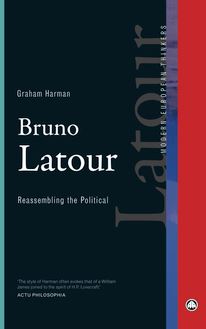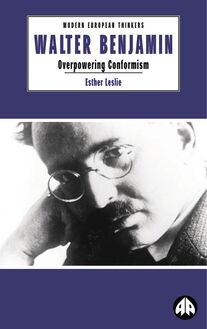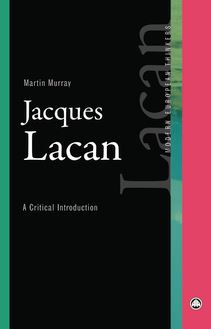-
 Univers
Univers
-
 Ebooks
Ebooks
-
 Livres audio
Livres audio
-
 Presse
Presse
-
 Podcasts
Podcasts
-
 BD
BD
-
 Documents
Documents
-
- Cours
- Révisions
- Ressources pédagogiques
- Sciences de l’éducation
- Manuels scolaires
- Langues
- Travaux de classe
- Annales de BEP
- Etudes supérieures
- Maternelle et primaire
- Fiches de lecture
- Orientation scolaire
- Méthodologie
- Corrigés de devoir
- Annales d’examens et concours
- Annales du bac
- Annales du brevet
- Rapports de stage
La lecture à portée de main
Vous pourrez modifier la taille du texte de cet ouvrage
Découvre YouScribe en t'inscrivant gratuitement
Je m'inscrisDécouvre YouScribe en t'inscrivant gratuitement
Je m'inscrisEn savoir plus
Vous pourrez modifier la taille du texte de cet ouvrage
En savoir plus

Description
In her examination of Benjamin's commentary on the politics and aesthetics of technology - from Benjamin's work on nineteenth-century industrial culture to his analyses of the Nazi deployment of the bomber - Esther Leslie re-contextualises Benjamin's writings in a lucid and cogently argued new study.
Author’s note
Preliminaries: An Accumulation of Technological Themes
1. Explosion of a Landscape
2. Benjamin’s Objectives
3. Berlin Chthonic, Photos and Trains and Films and Cars
4. Dream Whirled: Technik and Mirroring
5. Murmurs from Darkest Europe
6. The Work of Art in the Age of Unbearable Capitulation
7. Time for an Unnatural Death
Benjamin’s Finale; Excavating and Re-membering
Sujets
Informations
| Publié par | Pluto Press |
| Date de parution | 20 mai 2000 |
| Nombre de lectures | 1 |
| EAN13 | 9781783719617 |
| Langue | English |
Informations légales : prix de location à la page 0,1850€. Cette information est donnée uniquement à titre indicatif conformément à la législation en vigueur.
Extrait
Walter Benjamin
Modern European Thinkers
Series Editor: Professor Keith Reader, University of Newcastle upon Tyne
The Modern European Thinkers series offers low-priced introductions for students and other readers to the ideas and work of key cultural and political thinkers of the postwar era.
Jean Baudrillard Mike Gane
Edgar Morin Myron Kofman
Pierre Bourdieu Jeremy F. Lane
André Gorz Conrad Lodziak and Jeremy Tatman
Gilles Deleuze John Marks
Guy Hocquenghem Bill Marshall
Georges Bataille Benjamin Noys
Régis Debray Keith Reader
Julia Kristeva Anne-Marie Smith
Walter Benjamin
Overpowering Conformism
Esther Leslie
First published 2000 by Pluto Press 345 Archway Road, London N6 5AA and 22883 Quicksilver Drive, Sterling, VA 20166–2012, USA
Copyright © Esther Leslie 2000
The right of Esther Leslie to be identified as the author of this work has been asserted by her in accordance with the Copyright, Designs and Patents Act 1988.
British Library Cataloguing in Publication Data A catalogue record for this book is available from the British Library
ISBN 0 7453 1573 9 hbk ISBN 9 7817 8371 961 7 ePub ISBN 9 7817 8371 962 4 Kindle
Library of Congress Cataloging in Publication Data Leslie, Esther.
Walter Benjamin : overpowering conformism / Esther Leslie.
p. cm. — (Modern European thinkers)
Includes bibliographical references.
ISBN 0–7453–1573–9
1. Benjamin, Walter, 1892–1940—Political and social views.
I. Title. II. Series.
PT2603.E455 Z726 2000 838'.91209—dc21
00–020282
Designed and produced for Pluto Press by Chase Production Services, Chadlington, OX7 3LN Typeset from disk by Stanford DTP Services, Northampton Printed in the European Union by T.J. International, Padstow
Contents
Acknowledgements
Preface: An Accumulation of Technological Themes
1. Explosion of a Landscape
2. Benjamin’s Objectives
3. Berlin Chthonic, Photos and Trains and Films and Cars
4. Dream Whirled: Technik and Mirroring
5. Murmurs from Darkest Europe
6. The Work of Art in the Age of Unbearable Capitulation
7. Time for an Unnatural Death
Benjamin’s Finale: Excavating and Remembering
Notes
Bibliography
Index
Acknowledgements
The Collected Writings , Gesammelte Schriften , of Walter Benjamin appeared in 1991 as a 14-part box set. It contained not only juvenilia alongside multiple versions of the famous pieces and notes and drafts, but also an extensive ‘editorial apparatus’, with datings, excerpts of relevant correspondence, indication of first places of publication, types of paper and ink used and all the other things that an obsessive scholar needs and wants to know. (In this, it is unlike the English-language Walter Benjamin: Selected Writings from The Belknap Press of Harvard University Press.) The robust box set has served me well, and I thank the editors for all their scholarly effort. The Gesammelte Schriften was my main source of information, and this meant that I often translated quotations from Benjamin myself as I made notes for this book. I sometimes stick with those translations here, but I also provide page references to the relevant place in published English translations where those are available.
This book took on its shape over the 1990s. That decade opened with the calendrical opportunities for reflection offered by the 50th anniversary of Benjamin’s death. Then came the centenary celebrations, which were followed by the flurry around the opening of Dani Karavan’s monument at Portbou. All these events produced more and more words about Walter Benjamin. My contribution found first form as a doctorate, whose successful completion was much aided by my supervisor, Dr Margarete Kohlenbach, and my examiners, Professor Edward Timms and Dr Steven Giles. Since that completion, this contribution to the ever-growing pile of Benjaminiana has been recomposed time and again. Sometimes sentences or paragraphs found their way out of my study into articles or reviews or conference papers, only then to be altered and imported back again. Some might recognize certain turns of phrase. For opportunities to unravel further my thoughts on Benjamin I thank the editors of Things , Mute , the Journal of Design History , Art Criticism Theory , De-, Dis-, Ex- , Revolutionary History , New Formations and the organizers of the digital ‘Artwork project’ at London’s Camerawork and all the others who published my words or gave me a stage for an hour.
Above all, I thank my parents, George and Sheila, and Ben Watson.
Preface: An Accumulation of Technological Themes
On ‘overpowering conformism’
The phrase ‘overpowering conformism’ is a half-quote whose connotations mark out some parameters for a study of Walter Benjamin’s work. The phrase alludes to Benjamin’s caution in one of his final compositions, ‘ Über den Begriff der Geschichte ’, written at the end of the 1930s:
In every epoch the attempt must be made anew to wrest tradition away from a conformism that is about to overpower it. 1
Conformism here refers to the energies of conventional interpretation. These ensnare tradition and the receivers of tradition in tales devised, or at least approved, by the ruling class and its ideology-mongers. The accumulated experience of the oppressed is overwritten in histories that re-transmit the existing balance of power: business as usual. Long dead, Benjamin is himself now part of transmissible tradition. Using here the phrase ‘overpowering conformism’ flags a desire to wrest Benjamin from a conformism inherent in those appropriations that excise him from a culture of engaged political critique. ‘Overpowering conformism’ suggests a confrontation with domesticating readings of Benjamin’s work.
Wresting Benjamin’s writings from the conformism that threatens to overpower their reception is the task. Such an assignment is aided by taking cognizance of Benjamin’s onslaught on a second conformism mentioned in ‘Über den Begriff der Geschichte’ – the conformity of reformist theory and practice. 2 Reformism is still the conformity that overpowers the supposedly critically-minded. Nowadays it is frequently reformist-minded theorists who see reflected in Benjamin their own defeatist melancholy and desperate half-hope that, ameliorated by their wishful thinking, things might just work out for the best in the end, somehow. No major shake-ups intended. This is quite contrary to Benjamin’s intent. In his final notes on the concept of history, Benjamin attacks reformist political tactics and economic delusions for their bypassing of the insurgent, self-organized moment of proletarian revolution. For Benjamin, without revolution there can be no redemption from ‘this life here’, since revolution and redemption are fused. 3 In the wretched late 1930s, while some of his contemporaries looked to Moscow and others vacillated (and numerous others hailed Hitlerite Munich), Benjamin attacked the ‘innate’ conformism of the left parties. 4 Conformism of one sort manifests itself for him in 1939, in the chimera of an ever-onwards-and-upwards progress of history, a salvation that can take place without the intervention of revolutionary subjects. This desperate and blind faith flies in the face of an actual devastation – plain for all to see – of the working class and the labour movement. Benjamin recalls that such devastation set in after the failure of the Spartakus rebellion in Germany, and it was exacerbated by the regimes of Hitler and Stalin. He sees a downhill tumble of the prospects for workers’ self-activity. Not that he loses hope. But the reformist-meets-Stalinist trust in the progress of history, and the more or less wilful ignorance of Marx’s insistence on proletarian self-emancipation, mean that proclaimedly progressive ideologues overlook the catastrophic impact of the defeat of revolution in Germany in the Weimar years and after, and in the Soviet Union under Stalin. They put their faith in history, economy and theory, and do not put their energies into the re-animation of class struggle. Conformism incubates business as usual; that is to say, nothing changes, because to the conformists it seems that nothing very much needs to change. Benjamin thought that the so-called critics were mistaken. Business as usual is a state of emergency. In a defence of the absolutely revolutionary fracture, in thought and in practice, he concludes: ‘That it continues “like this” is the catastrophe.’ 5
From the mid-1920s, Benjamin investigates Marxism. He explores Marxist theory, enters into dialogue with Marxists and visits the Soviet Union. Benjamin is a nonconformist, often sceptical about trends engendered by the Communist Party of his day. His misgivings multiply as Stalinism solidifies its rule, and what passes for Marxist analysis extinguishes its revolutionary spark. He deploys the tools of historical materialism quirkily, and yet no more idiosyncratically than does the ‘official’ Marxism of the party. Benjamin’s nonconformism is conspicuous in his critical interrogations of the ways in which party communists make use of Marxist maxims.
It may be tedious to participate in prolonging the game of selecting quotations, reinserting ellipses, arguing over the political affiliations of a dead man. But asserting the revolutionary underpinning of somebody’s thought is, if nothing else, a poke in the eye of those perpetrators of scholarship who endlessly defuse, debarb and domesticate that which has slipped into the intellectual bequest. However, recovering theory is not a matter of archival accuracy alone. Benjamin’s political work is still of interest if its strategies and insights can be of use for analysis and action today, if it can be used as a resource and research tool for overpowering present political and cultural conformism, if it can be found to possess continuing relevance or, maybe, Aktualität .
Aktualität is a word that recurs in Benjamin’s writing. For example, it appears in 1921, when he announces the formation of a journal
-
 Univers
Univers
-
 Ebooks
Ebooks
-
 Livres audio
Livres audio
-
 Presse
Presse
-
 Podcasts
Podcasts
-
 BD
BD
-
 Documents
Documents
-
Jeunesse
-
Littérature
-
Ressources professionnelles
-
Santé et bien-être
-
Savoirs
-
Education
-
Loisirs et hobbies
-
Art, musique et cinéma
-
Actualité et débat de société
-
Jeunesse
-
Littérature
-
Ressources professionnelles
-
Santé et bien-être
-
Savoirs
-
Education
-
Loisirs et hobbies
-
Art, musique et cinéma
-
Actualité et débat de société
-
Actualités
-
Lifestyle
-
Presse jeunesse
-
Presse professionnelle
-
Pratique
-
Presse sportive
-
Presse internationale
-
Culture & Médias
-
Action et Aventures
-
Science-fiction et Fantasy
-
Société
-
Jeunesse
-
Littérature
-
Ressources professionnelles
-
Santé et bien-être
-
Savoirs
-
Education
-
Loisirs et hobbies
-
Art, musique et cinéma
-
Actualité et débat de société
- Cours
- Révisions
- Ressources pédagogiques
- Sciences de l’éducation
- Manuels scolaires
- Langues
- Travaux de classe
- Annales de BEP
- Etudes supérieures
- Maternelle et primaire
- Fiches de lecture
- Orientation scolaire
- Méthodologie
- Corrigés de devoir
- Annales d’examens et concours
- Annales du bac
- Annales du brevet
- Rapports de stage

















